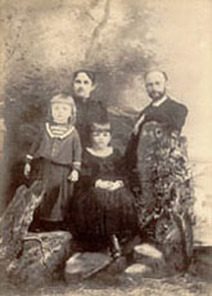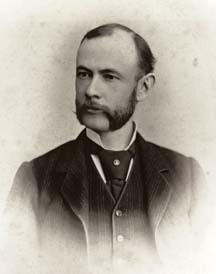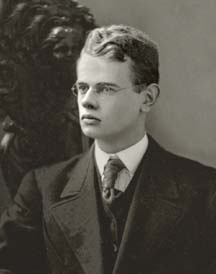The Weaver Family

For 125 years, the Weaver family made significant, though varied, contributions to the Borough of Macungie. This essay is devoted to the first three generations of Weaver men: Valentine Weygandt Weaver, who served as superintendent of the Millerstown Iron Company during the mid-1870s, his son William Mickley Weaver, who served as superintendent of the reorganized Macungie Iron Company from 1879 until his death in 1890, and his grandson William Singmaster Weaver, a prominent businessman and civic leader during the twentieth century.
Valentine Weygandt Weaver, the first member of the family to settle in Macungie, was a fifth-generation Pennsylvania German. He was born in Northampton County on January 9, 1826, and was educated in local schools. In 1846, at the age of 20, he became a machinist apprentice at the Crane Iron Company in Catasauqua. In 1848 he married Mary Mickley (1820-1901), daughter of Jacob Mickley; and in the same year Samuel Thomas, the son of David Thomas, superintendent of the Crane Iron Company, married Mary Mickley’s sister, Rebecca. When the Thomas Iron Company was formed in 1854, Samuel Thomas was named superintendent and Val Weaver was appointed as his brother-in-law’s assistant. Thomas was elevated to the presidency of the company in 1864, and Weaver succeeded him as superintendent. When the officers of the Thomas Iron Company formed the Lock Ridge Iron Company in 1866 at present-day Alburtis, Val Weaver was chosen to supervise the construction of the furnace plant. The first furnace at Lock Ridge was blown in on March 18, 1868, and the entire capital stock was acquired by the Thomas Iron Company on May 1, 1869. Weaver blew in the second furnace at Lock Ridge on July 9, 1869, and remained at Lock Ridge as superintendent until August 1873.
In late 1873 he went to Pine Grove, Cumberland County, to manage the mines of the South Mountain Iron Company, in which the Thomas Iron Company had a financial interest. This mining venture was unsuccessful due to the collapse of the ore market following the Panic of 1873. Val Weaver returned to Lehigh County and built the large Gothic mansion on South Church Street in Millerstown (Macungie). This house, which has since been converted into apartments, is a close copy of the one he had built for himself at Lock Ridge a few years earlier. He lived a semi-retired life in Millerstown (renamed Macungie in 1875) on his income as one of the early stockholders in the Thomas Iron Company.
By 1875, the Millerstown Iron Company, which had been formed in 1873 by local merchants, was floundering due the depression following the 1873 panic. In August 1875, Val Weaver offered to purchase $10,000 worth of the company’s stock and agreed to serve as its superintendent for a salary of $3,000 per year. The directors eagerly accepted his offer as they needed the cash and welcomed his experience. However, despite his valiant efforts to keep the company afloat, by August 1879 it was effectively bankrupt. While his inability to save the Millerstown Iron Company may have hurt his pride, he was resilient and not without financial resources. Within a few months, he became part owner and superintendent of the recently reorganized Coplay Iron Company. He remained manager of that company until retiring in 1884, after which he returned to Macungie. Besides his numerous ventures in the local iron industry, Val was a director of the Catasauqua Manufacturing Company, the Catasauqua National Bank, and the Slatington National Bank. He died on October 11, 1893, while visiting Catasauqua on business.
Valentine Weygandt Weaver, the first member of the family to settle in Macungie, was a fifth-generation Pennsylvania German. He was born in Northampton County on January 9, 1826, and was educated in local schools. In 1846, at the age of 20, he became a machinist apprentice at the Crane Iron Company in Catasauqua. In 1848 he married Mary Mickley (1820-1901), daughter of Jacob Mickley; and in the same year Samuel Thomas, the son of David Thomas, superintendent of the Crane Iron Company, married Mary Mickley’s sister, Rebecca. When the Thomas Iron Company was formed in 1854, Samuel Thomas was named superintendent and Val Weaver was appointed as his brother-in-law’s assistant. Thomas was elevated to the presidency of the company in 1864, and Weaver succeeded him as superintendent. When the officers of the Thomas Iron Company formed the Lock Ridge Iron Company in 1866 at present-day Alburtis, Val Weaver was chosen to supervise the construction of the furnace plant. The first furnace at Lock Ridge was blown in on March 18, 1868, and the entire capital stock was acquired by the Thomas Iron Company on May 1, 1869. Weaver blew in the second furnace at Lock Ridge on July 9, 1869, and remained at Lock Ridge as superintendent until August 1873.
In late 1873 he went to Pine Grove, Cumberland County, to manage the mines of the South Mountain Iron Company, in which the Thomas Iron Company had a financial interest. This mining venture was unsuccessful due to the collapse of the ore market following the Panic of 1873. Val Weaver returned to Lehigh County and built the large Gothic mansion on South Church Street in Millerstown (Macungie). This house, which has since been converted into apartments, is a close copy of the one he had built for himself at Lock Ridge a few years earlier. He lived a semi-retired life in Millerstown (renamed Macungie in 1875) on his income as one of the early stockholders in the Thomas Iron Company.
By 1875, the Millerstown Iron Company, which had been formed in 1873 by local merchants, was floundering due the depression following the 1873 panic. In August 1875, Val Weaver offered to purchase $10,000 worth of the company’s stock and agreed to serve as its superintendent for a salary of $3,000 per year. The directors eagerly accepted his offer as they needed the cash and welcomed his experience. However, despite his valiant efforts to keep the company afloat, by August 1879 it was effectively bankrupt. While his inability to save the Millerstown Iron Company may have hurt his pride, he was resilient and not without financial resources. Within a few months, he became part owner and superintendent of the recently reorganized Coplay Iron Company. He remained manager of that company until retiring in 1884, after which he returned to Macungie. Besides his numerous ventures in the local iron industry, Val was a director of the Catasauqua Manufacturing Company, the Catasauqua National Bank, and the Slatington National Bank. He died on October 11, 1893, while visiting Catasauqua on business.
William Mickley Weaver

William Mickley Weaver (circa 1886)
A resurgence in the iron market in 1879 led to a reorganization of the Millerstown Iron Company as the Macungie Iron Company and Val Weaver’s son, William Mickley Weaver, was appointed its superintendent. William Mickley Weaver was a remarkable young man. He was born July 6, 1851, in Catasauqua, was educated in local schools and, at the age of 18 or 19, was sent to the Baldwin Locomotive Works in Philadelphia to learn the mechanical skills essential for success in the steam-driven technology of the nineteenth century. After three years at Baldwin, he returned to the Lehigh Valley where he succeeded his father as superintendent of the Lock Ridge furnaces. Then only 22, he was the youngest furnace superintendent in Pennsylvania up until that time. He served in that position from October 16, 1873, until April 7, 1877, when he was succeeded by his cousin Edwin Thomas, son of Samuel Thomas.
When he undertook the management of the Macungie furnace, William was faced with the daunting task of putting it back into operation. He had to order parts and equipment to make needed repairs, rehire employees, order in raw materials, and supervise all the reconstruction work. These tasks he ably performed and continued to manage the furnace successfully for the next decade.
On October 21, 1880, he married Ella Singmaster (1854-1929), the daughter of James and Sarah (Mattern) Singmaster. The ceremony was performed in Saint Matthew’s Lutheran Church, the congregation of which was supported, both spiritually and financially, by Ella’s father. William M. and Ella S. Weaver had two children, Edna May, born June 2, 1882, and William Singmaster, born June 2, 1886. Throughout their marriage, they resided with Ella’s parents in the elegant Victorian home at 10 East Main Street that James Singmaster had built in the early 1870s.
William’s major avocation was photography, and he was a local pioneer in this field. He made his own equipment and processed the plates and prints in his workshop next to his home. In the 1914 Anniversary History of Lehigh County, he was acknowledged as the “first amateur photographer of distinction in Lehigh County.” Many of his photographs documenting village life in Macungie during the 1880s are on display in the museum, or are in the archives of the Macungie Historical Society. These photographs include interior views, rare for the period, family portraits, local construction activities, accidents and natural disasters, including the blizzard of 1888. Few communities possess such an early and varied photographic record. When he died on March 19, 1890, at the age of only 38, his workshop and darkroom remained as he left them, a rare time capsule of the late 19th century, until the property was sold in the 1980s. He is buried with his wife Ella in the James Singmaster family plot in Macungie’s Fairview Cemetery.
When he undertook the management of the Macungie furnace, William was faced with the daunting task of putting it back into operation. He had to order parts and equipment to make needed repairs, rehire employees, order in raw materials, and supervise all the reconstruction work. These tasks he ably performed and continued to manage the furnace successfully for the next decade.
On October 21, 1880, he married Ella Singmaster (1854-1929), the daughter of James and Sarah (Mattern) Singmaster. The ceremony was performed in Saint Matthew’s Lutheran Church, the congregation of which was supported, both spiritually and financially, by Ella’s father. William M. and Ella S. Weaver had two children, Edna May, born June 2, 1882, and William Singmaster, born June 2, 1886. Throughout their marriage, they resided with Ella’s parents in the elegant Victorian home at 10 East Main Street that James Singmaster had built in the early 1870s.
William’s major avocation was photography, and he was a local pioneer in this field. He made his own equipment and processed the plates and prints in his workshop next to his home. In the 1914 Anniversary History of Lehigh County, he was acknowledged as the “first amateur photographer of distinction in Lehigh County.” Many of his photographs documenting village life in Macungie during the 1880s are on display in the museum, or are in the archives of the Macungie Historical Society. These photographs include interior views, rare for the period, family portraits, local construction activities, accidents and natural disasters, including the blizzard of 1888. Few communities possess such an early and varied photographic record. When he died on March 19, 1890, at the age of only 38, his workshop and darkroom remained as he left them, a rare time capsule of the late 19th century, until the property was sold in the 1980s. He is buried with his wife Ella in the James Singmaster family plot in Macungie’s Fairview Cemetery.
William Singmaster Weaver

William Singmaster Weaver (circa 1905)
William M. Weaver’s son, William Singmaster Weaver, became a prominent member of the Macungie community in the twentieth century, and achieved great success as a farmer, orchardist, and nut grower. In 1911 he married Adelaide Audelle Hufford (1888-1980), of Allentown, and the same year started farming. In the early years, he planted wheat and potatoes, kept dairy cattle, raised hogs, and fattened steers. Gradually, however, more and more acres were put in peach and apple orchards. He became interested in bee culture, and maintained many beehives to pollinate the blossoms. Will’s main passion was nut trees. Distressed by the loss of the American chestnut trees during the early part of the twentieth century, he started experimenting with the grafting of Chinese chestnuts in 1925, becoming one of the country’s leading experts in this field. He soon became a prominent member of the Northern Nut Growers Association and the Pennsylvania Nut Growers Association, and in 1956, he was one of the growers who planted nut trees on the Gettysburg farm of President Dwight D. Eisenhower.
William S. Weaver was a founding member of the Macungie Grange and the Lehigh County Agricultural Extension Association, which he served as Secretary for 41 years. But William Weaver’s interests were not restricted to farming. He served on Borough Council for many years, part of the time as council president, and was a president of the Macungie Bank. He was also a lifelong member of Saint Matthew’s Lutheran Church, where he served on Church Council and as superintendent of the Sunday School. William and Adelaide’s only child was a daughter, Elizabeth Adelaide, who married the Rev. Clarence H. Moatz in 1937. William S. Weaver died on January 29, 1967, and is buried with his wife Adelaide in the James Singmaster family plot in Fairview Cemetery.
Reference Sources:
A History of Lower Macungie Township. Lower Macungie Township Bicentennial Committee, 1976; second edition, Lower Macungie Township Historical Society, 1996.
Bartholomew, Craig L. “The Weaver Years at the Macungie Furnace” in Ironmasters Conference. Easton: Canal History and Technology Press, 2001, 69-99.
Mathews, Alfred, and Austin N. Hungerford. History of the Counties of Lehigh and Carbon, in the Commonwealth of Pennsylvania. Philadelphia: Everts & Richards, 1884.
Minute Book of the Board of Directors’ Meetings of The Millerstown Iron Company, 1873‑1879.
Roberts, Charles Rhoads, et al. HistoryofLehighCounty,Pennsylvania. 3 vols. Allentown: Lehigh County Historical Society, 1914. Singmaster Family Scrapbook. Miscellaneous newspaper clippings and obituaries from various local newspapers, circa 1880-1920.
William S. Weaver was a founding member of the Macungie Grange and the Lehigh County Agricultural Extension Association, which he served as Secretary for 41 years. But William Weaver’s interests were not restricted to farming. He served on Borough Council for many years, part of the time as council president, and was a president of the Macungie Bank. He was also a lifelong member of Saint Matthew’s Lutheran Church, where he served on Church Council and as superintendent of the Sunday School. William and Adelaide’s only child was a daughter, Elizabeth Adelaide, who married the Rev. Clarence H. Moatz in 1937. William S. Weaver died on January 29, 1967, and is buried with his wife Adelaide in the James Singmaster family plot in Fairview Cemetery.
Reference Sources:
A History of Lower Macungie Township. Lower Macungie Township Bicentennial Committee, 1976; second edition, Lower Macungie Township Historical Society, 1996.
Bartholomew, Craig L. “The Weaver Years at the Macungie Furnace” in Ironmasters Conference. Easton: Canal History and Technology Press, 2001, 69-99.
Mathews, Alfred, and Austin N. Hungerford. History of the Counties of Lehigh and Carbon, in the Commonwealth of Pennsylvania. Philadelphia: Everts & Richards, 1884.
Minute Book of the Board of Directors’ Meetings of The Millerstown Iron Company, 1873‑1879.
Roberts, Charles Rhoads, et al. HistoryofLehighCounty,Pennsylvania. 3 vols. Allentown: Lehigh County Historical Society, 1914. Singmaster Family Scrapbook. Miscellaneous newspaper clippings and obituaries from various local newspapers, circa 1880-1920.
Copyright (c) 2011 by the Macungie Historical Society, Inc. All Rights Reserved.